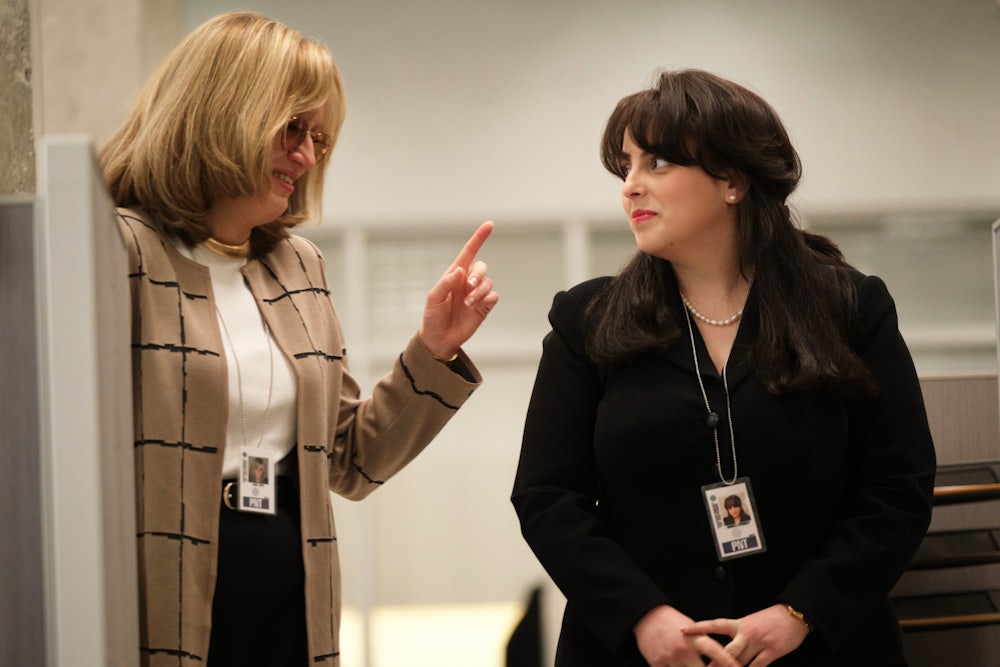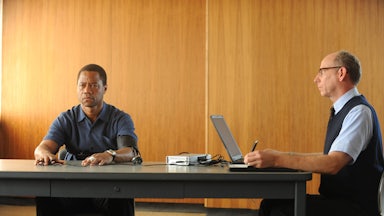Here’s how much I enjoyed the first seven out of 10 episodes of FX’s Impeachment: American Crime Story: As soon as I ran out of screeners, I spent Labor Day weekend marathoning all 10 episodes of The People v. O.J. Simpson, the original, critically acclaimed American Crime Story miniseries that aired in 2016 and that I’d never gotten around to watching. Both shows dramatize real events from the 1990s that made for great TV at the time, and both make for great TV in their own right.
American Crime Story has developed a formula that recreates the guilty pleasures of following these exhaustively covered scandals while also subjecting them to meticulously fair retrospective critiques. In both shows, expert pacing makes all the legalistic complexities of the scandals in question comprehensible, while flawless casting keeps us invested. It’s the actors who manage to locate something sympathetic and human in each of these familiar and mutually antagonistic characters. What ACS grasps, and what prevents the shows from becoming tediously didactic, is that these stories were riveting for a reason. The success of both shows can be measured by how believably they replicate the sensation of being engrossed by these events as they unfolded in real time.
The saga of Bill Clinton’s impeachment, which totally dominated American politics and media from 1998 to 1999, has been undergoing a public reevaluation for several years. This is partly due to the Clintons’ declining clout since Donald Trump’s victory over Hillary in 2016, as well as the #MeToo movement, which has drawn attention to the myriad ways women are exploited and abused in the workplace. It’s also part of a related cultural trend, in which vilified women from the ’90s, from Tonya Harding to Anita Hill, are receiving more nuanced reexaminations than the media offered them at the time. What makes the impeachment story so additionally ripe for revisiting is the emergence of one of its central characters, Monica Lewinsky, from a decade of self-imposed exile.
Beginning with a Vanity Fair article in 2014 and continuing with a widely discussed TED talk on bullying and public shaming in 2015, Lewinsky has belatedly embraced fame on her own terms, taking charge of the narrative that was imposed upon her after the public exposure of her affair with Clinton during her White House internship. By seemingly all accounts, recent history’s most relentless slut-shaming could not have happened to a nicer person. Lewinsky, now 48, has won over a large and influential fan base with her humor, self-awareness, and resilience. Those qualities are evident in Impeachment, on which she served as a co-producer at the invitation of director and executive producer Ryan Murphy, providing insights that lend the series authenticity. (When Lewinsky delivers pizza to the West Wing, for instance, real Washingtonians will recognize that it comes from Armand’s.)
Lewinsky is portrayed by 28-year-old Beanie Feldstein (Booksmart, Lady Bird), who clearly feels a deep rapport with her character. “We’re both Jewish girls from L.A. who listen to showtunes on the treadmill,” Feldstein told Vanity Fair recently (a lot of the casting, from Billy Eichner’s Matt Drudge to Cobie Smulders’s Ann Coulter to the so-far-underutilized Edie Falco’s Hillary Clinton, is similarly on the nose, which is not a complaint at all). Feldstein’s task is to capture realistically what the public had no interest in understanding about Lewinsky in the ’90s—her intelligence, her loyalty, her refusal to break under FBI interrogation, her earnestness, her past experience of being taken advantage of by a significantly older man—while still exposing those aspects of her behavior that Lewinsky herself must find embarrassing today. The Lewinsky who had an affair with Clinton was cripplingly insecure, kind and trusting to a fault, a bit self-absorbed in the way lots of recent college graduates in Washington are, and delusional about her one-sided relationship with the president—and it’s to Feldstein’s credit, and Lewinsky’s, that all of this is on display amid the story of her martyrdom.
Clinton is somehow the most familiar and the most enigmatic of the central characters, and while it may take a beat for audiences to accept the British actor Clive Owen in the role of a universally recognizable Arkansan, things soon click into place. Owen is able to channel three of the forty-second president’s much-documented qualities: first, Clinton’s magnetic charisma, his infamous ability to look anyone in the eye and make them feel fully seen, which in the case of Lewinsky escalates to literal seduction; second, his cold-blooded, calculating political instincts, which enable him to discard Lewinsky ruthlessly the instant she becomes a liability; and third, the simmering competitive rage that compels him to fight for his presidency when a more sober-minded politician might have done the decent thing and resigned. The script for Impeachment also strongly implies that Clinton is guilty of all of the sexual misconduct alleged by Paula Jones (Annaleigh Ashford), Kathleen Willey (Elizabeth Reaser), and Juanita Broaddrick, all of whom are treated as credible accusers—and while none of the misconduct itself is actually shown on camera, Owen’s performance makes it all seem horribly plausible. The series is no right-wing hit job, and while liberal journalists have been getting more vocally critical of Clinton’s treatment of women over the past several years, this may be the first pop-cultural depiction in which Clinton comes off as not just incorrigible but also predatory.
Still, the central character in this story is neither Clinton nor Lewinsky but rather one of the great villains in recent American life, Linda Tripp, masterfully played by Sarah Paulson, who was also remarkable in the role of Marcia Clark in the O.J. miniseries. Tripp, the ostensible friend who secretly recorded her intimate conversations with Lewinsky about the affair and turned the tapes over to the special counsel investigating the Clinton administration, has always been the least sympathetic player in the whole scandal, and for good reason. Paulson’s challenge is to make Tripp interesting and to identify how she rationalized a personal betrayal so monstrous it transcends politics.
On a superficial level, Tripp recognized before most liberals did that Clinton had to be held to account for his unacceptable behavior, but her disapproval of that behavior was rooted neither in feminist solidarity with victims of sexual harassment nor in Christian moralism. Instead, Tripp’s core motivation seems to have been spite. Paulson’s Tripp is a bitterly divorced suburban single mother who frequently disparages her own appearance, which would later be lampooned by John Goodman on Saturday Night Live after the scandal broke, and her rage at Clinton is matched or surpassed by her rage at the women who attract his attention. A holdover from George H.W. Bush’s administration, Tripp is working, at the start of the series, under Clinton’s White House deputy counsel Vince Foster, just prior to his 1993 suicide (which is portrayed on-screen in the first episode, and which would subsequently become a focal point of right-wing conspiracy theories throughout the Clinton years). In the aftermath, she finds herself transferred to a sterile cubicle at the Pentagon, which she takes as a personal humiliation. Egged on by the amoral publicist Lucianne Goldberg (played by a scene-chewing Margo Martindale) to turn her West Wing gossip into a disposable tell-all memoir, Tripp sees the arrival of a similarly exiled Lewinsky at the Pentagon as her meal ticket. Her disingenuous extended performance of mentorship to the heartbroken 23-year-old is the kind of dramatic scenario that might seem contrived in fiction—much like the existence of the telltale blue dress she persuades Lewinsky not to have dry-cleaned—but you really can’t make this stuff up.
As a child of the D.C. suburbs, I found Paulson’s performance resonated, because it’s very rare to see a character like Tripp—the kind of unglamorous, clock-punching, mid-tier, career federal bureaucrat on whose labor the Beltway runs—get such an extended fictionalized treatment. Her apparent bond with the Beverly Hills–reared and fashion-conscious Lewinsky, with whom she goes antiquing ahead of her unsettlingly Teutonic annual Christmas party, is a marvelous study in how professional and personal distress can forge human connections across cultural divides—and how those connections, in turn, can be weaponized. Tripp embodies a particular conservative archetype the historian Rick Perlstein explores in his 2009 book, Nixonland: a conservatism rooted primarily in the resentment that the ordinary and mediocre feel toward liberals with more social capital. While that’s a terrible excuse both for right-wing politics and for wiretapping an emotionally vulnerable colleague, it’s also a rich vein for an actress of Paulson’s caliber to mine.
The “vast right-wing conspiracy” that Hillary Clinton would allege was responsible for her husband’s troubles gets plenty of screen time, as well. It includes media figures like Drudge and Coulter, as well as legal minds like Kenneth Starr and his young henchmen Brett Kavanaugh and George Conway, and the somewhat less famous Susan Carpenter-McMillan (Judith Light), a wealthy operative who takes the hapless Paula Jones under her wing. It excuses nothing Bill Clinton did to recall that his presidency was nearly brought down by a reactionary cabal that exploited his accusers no less cynically than he did, in pursuit of an agenda far removed from the public interest.
One thing Impeachment doesn’t have is sex: We see the flirtations between Clinton and Lewinsky, and the resulting sex acts the public would eventually hear far too much about are clinically described when the plot demands it, but the acts themselves are left tastefully off-screen. This might seem surprising, since the conventional wisdom has always been that the scandal was fundamentally about sex, and not about the supposed high crime of lying about sex under oath in a civil suit. But the impeachment drama was about a lot more than sex and lies: It was one episode in the still-ongoing power struggle among competing petty factions in our decadent imperial capital—distinguished above all by the women whose lives and reputations were its collateral damage.








